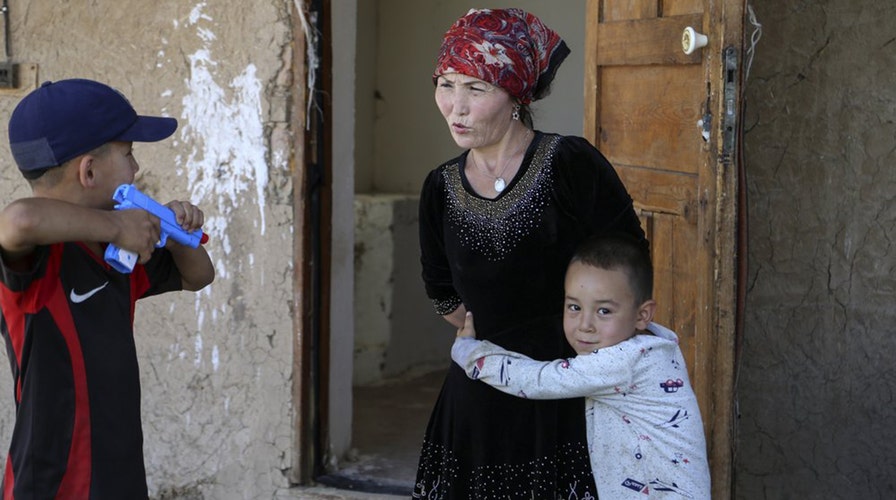Fox News Flash top headlines for June 29
Fox News Flash top headlines are here. Check out what's clicking on Foxnews.com.
China is subjecting hundreds of thousands of women to forced birth control methods — or even mandatory abortions — as part of the government’s campaign to slash birth rates among the predominantly Muslim Uighurs and other minority groups, according to a report published Monday.
While individual women have spoken out before about forced birth control, the practice is far more widespread and systematic than previously known, according to a recent Associated Press investigation based on government statistics, state documents and interviews with 30 ex-detainees, family members and a former detention camp instructor.
The campaign over the past four years in the far west region of Xinjiang is leading to what some experts are calling a form of “demographic genocide.”
CHINA'S NATIONAL SECURITY BILL FOR HONG KONG THREATENS LIBERTIES, AUTONOMY: US, WESTERN POWERS

Alif Baqytali hugs his mother, Gulnar Omirzakh, at their new home in Shonzhy, Kazakhstan. Omirzakh, a Chinese-born ethnic Kazakh, says she was forced to get an intrauterine contraceptive device, and that authorities in China threatened to detain her if she didn't pay a large fine for giving birth to Alif, her third child.
The state regularly subjects minority women to pregnancy checks and forces intrauterine devices, sterilization and even abortion on hundreds of thousands, the report claims. Even while the use of IUDs and sterilization has fallen nationwide, it is rising sharply in Xinjiang.
The population control measures are backed by mass detention both as a threat and as a punishment for failure to comply. Having too many children is a major reason people are sent to detention camps, the AP found, with the parents of three or more ripped away from their families unless they can pay huge fines. Police raid homes, terrifying parents as they search for hidden children.
Gulnar Omirzakh, a Chinese-born Kazakh, said the government ordered her to get an IUD inserted after she had her third child in 2016. But two years later, in January 2018, Omirzakh claimed four officials in military camouflage came knocking at her door anyway and gave her three days to pay a $2,685 fine for having more than two children.
Omirzakh said the men warned her that she would join her husband, a detained vegetable trader, and a million other ethnic minorities locked up in internment camps, if she didn’t pay the fine.
“God bequeaths children on you. To prevent people from having children is wrong,” she said. “They want to destroy us as a people.”
Birth rates in the mostly Uighur regions of Hotan and Kashgar plunged by more than 60 percent from 2015 to 2018, the latest year available in government statistics. Across the Xinjiang region, birth rates continue to plummet, falling nearly 24 percent last year alone — compared to just 4.2 percent nationwide, statistics show.

This Saturday, June 13, 2020 photo shows a January 2018 document telling Gulnar Omirzakh, a Chinese-born ethnic Kazakh, that she must pay a fine of 17,405 RMB ($2685) for having a third child, at her new home in Shonzhy, Kazakhstan. She says she was forced to get an intrauterine contraceptive device, and that Chinese authorities threatened to detain her if she didn't pay the fine for having a third child.
The hundreds of millions of dollars the government pours into birth control has transformed Xinjiang from one of China’s fastest-growing regions to among its slowest in just a few years, according to new research by China studies scholar Adrian Zenz.
“This kind of drop is unprecedented... there’s a ruthlessness to it,” said Zenz, an independent contractor with the nonprofit Victims of Communism Memorial Foundation in Washington, D.C. “This is part of a wider control campaign to subjugate the Uighurs.”
CLICK HERE TO GET THE FOX NEWS APP
China’s foreign ministry called the story “fabricated” and “fake news,” saying the government treats all ethnicities equally and protects the legal rights of minorities.
“Everyone, regardless of whether they’re an ethnic minority or Han Chinese, must follow and act in accordance with the law,” ministry spokesman Zhao Lijian said Monday.
The Associated Press contributed to this report.








































